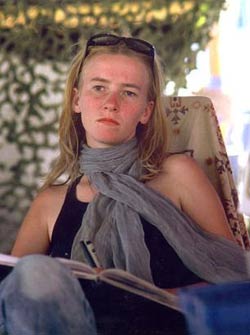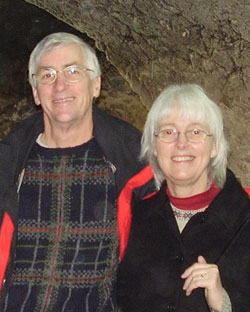Revolution #70, November 26, 2006
Learning from Rachel
An Interview with Cindy and Craig Corrie
 |
Rachel Corrie |
 |
Craig and Cindy Corrie |
“…When that explosive detonated yesterday it broke all the windows in the family’s house. I was in the process of being served tea and playing with the two small babies.
“I’m having a hard time right now. Just feel sick to my stomach from being doted on very sweetly, by people who are facing doom. I know that from the United States it all sounds like hyperbole. A lot of the time the kindness of the people here, coupled with the willful destruction of their lives, makes it seem unreal to me. I can’t believe that something like this can happen in the world without a bigger outcry…”
The voice is that of a 23-year-old American woman, Rachel Corrie, writing to her parents from Rafah, Palestine. She was there as a volunteer with the International Solidarity Movement, an organization which organizes resistance to Israeli occupation of Palestinian land using non-violent direct-action methods.
On March 16, 2003, Rachel was run over and killed by a member of the Israeli Defense Force as she stood between a US-made bulldozer and a Palestinian family’s home targeted for demolition. In the days and weeks following her death, the extraordinary emails she had written to her parents about her experience in Rafah circulated across the world.
Rachel’s parents, Cindy and Craig Corrie, took their grief back out into the world—courageously telling Rachel’s story over and over again—as part of telling the larger story, as they put it, of what is unfolding in Palestine. The Corries took to heart Rachel’s call, “This has to stop. I think it is a good idea for us all to drop everything and devote our lives to making this stop.”
In April 2005, a play taken from Rachel’s writings, MY NAME IS RACHEL CORRIE, edited by Alan Rickman and Katharine Viner, opened to great acclaim at the Royal Court Theatre in London. A year later, just as the play was slated to open in New York City at New York Theatre Workshop, the theater caved in to pressures from pro-Israel forces and cancelled the production. Rickman and Viner found another New York theater to produce the play. MY NAME IS RACHEL CORRIE is currently running at the Minetta Lane Theatre, the production recently extended to December 30, 2006.
I first met the Corries back in August 2004 on the eve of the Republican National Convention when they came to New York City to accept a “Courageous Resister” award for Rachel from Refuse & Resist. We have stayed in touch and when they were back here last week we got together at a Brooklyn diner to talk about Rachel, the play, Olympia, WA, and the wide world we all confront.
* * * * *
CJ: I saw the play with two friends, young women, and they were both crying quietly through most of the play. One of them is Rachel’s age and as the curtain went down she said, “I know if I’d lived in Olympia we would have been friends.” The thing that struck her, and me, about Rachel— she seemed to not flinch from looking at the world as it really was, and then took responsibility for that. And she did not just ask am I doing enough, but am I doing the right thing? Once she’d gone to a place like Palestine and seen what her own government is doing to people, she wanted to not just register protest, but to actually STOP it. Can you talk about this quality of Rachel?
Cindy Corrie: Well, you saw that in the ten-year-old. There was something in the education she had as a young child in her elementary school program. She was in Options, a public school alternative program that we helped to create. It was important to us that this program be within the public school system. We were looking for something that would empower our kids. The core idea was that kids needed to connect to the community and be active participants, and then that their concept of community be extended to the entire world. Rachel had these fabulous teachers. Options remains a very wonderful program. It’s now twenty years old. I think it had a huge impact on Rachel. There were other times when she saw a problem and had to do something about it. I think that was a really strong message she got throughout elementary school and beyond.
CJ: What also struck me watching the play was that Rachel looked at the situation of the Palestinian people and said this is an occupied nation, an open-air prison essentially. The “Palestinian narrative” and “Israeli narrative” are not equally true. One group of people is subjugating another, and it’s wrong.
Cindy Corrie: She was a wonderful observer, always. And I think that comes through in her writing, in those incredibly simple lines. There was a unique way in which she expressed herself. She thought a little differently than other people did. I’m so often surprised again when I hear the lines in the play at how artfully she articulated what she thought. There is universality in much of what she says, but it’s still uniquely her own view of things. Just her way of looking at the world and approaching it, was unique to her, and often enlightening to us. We felt pretty fortunate most of the time simply being in a space with Rachel where we could enjoy and benefit from her thinking.
Craig Corrie: About Rachel’s activism, it’s natural to you [speaking to Cindy] whereas … it’s not really natural to me. But it’s important. People’s children are being killed, dammit. That’s gotta stop. So we have to stop it. I was having a discussion with some staffers on Capitol Hill with Cindy’s sister, Cheryl, who was kind of in their face about something, and this staffer said, “Well, this is your passion.” And Cheryl said, “No, it’s not my passion. My garden’s my passion, and if you guys would do your job then I could go back and work on my garden!” [laughter]
CJ: It’s heavy because people ARE being drawn out of their gardens. There is no referee up there. It’s up to us to stop them.
Craig/Cindy: Yes.
CJ: I saw that you [spoke] at the World Can’t Wait demonstration in front of the White House on October 5. What did you say?
Craig Corrie: I talked about the buildings around us, how we have walked through all of them trying to make our government work for us. I talked about the temporary tenants who are attacking our freedoms. Just the idea of abolishing habeas corpus is abominable. As a veteran and the son of a veteran it’s shocking to me that this president abuses the Constitution that he’s sworn to protect.
CJ: I imagine that for a lot of people who watch this play, the journey they’re taking is through your parts in the play. She obviously learned a great deal from you and then she went out in the world and came back with some new things, and she struggled with you. What was it like—her arguing with you?
Craig Corrie: She did bring us into it. I talked about how Rachel had a different way of looking at things—[there were] differences we would have over some things. She was very disapproving of corporate America, as so many people who are around me now are. But of course my life has been in corporate America. And I very much treasure the people that I worked with there. They were very kind people. They may have had blind spots but the people in the companies I worked with were trying to help every employee and the customers. They were great people. There’s a difference in some perceptions, but Rachel wouldn’t lie. When she wrote, she wouldn’t write something untrue. She might write something artistic, but she was writing what she was seeing and I knew it was true.
Cindy Corrie: …When she was growing up, there were times when I certainly challenged her about things and she would openly challenge us. She would really debate with us about things. In fact one of the last conversations was in a restaurant in Olympia.
Craig Corrie: She was so mad at me she was in tears.
Cindy Corrie: We’d have these big discussions that would be pretty intense but never would we get mad at each other and not speak to each other for even an hour or a day. But she was struggling with the fact that we— her family—were fairly blissfully ignoring much that was going on in the world—it was adding a lot of meaning to her life—the political work she was doing in Olympia—and her insights about a lot of what was going on in the world were…frankly she was ahead of us in things. We weren’t paying as much attention… She wanted us to tune in and get these things. It was staggering to us to get the emails from Rachel [from Palestine]. She was careful to give me information, websites to go to and books to read. Which I did. She was providing that education; she wanted to bring us along…
If you like this article, subscribe, donate to and sustain Revolution newspaper.



